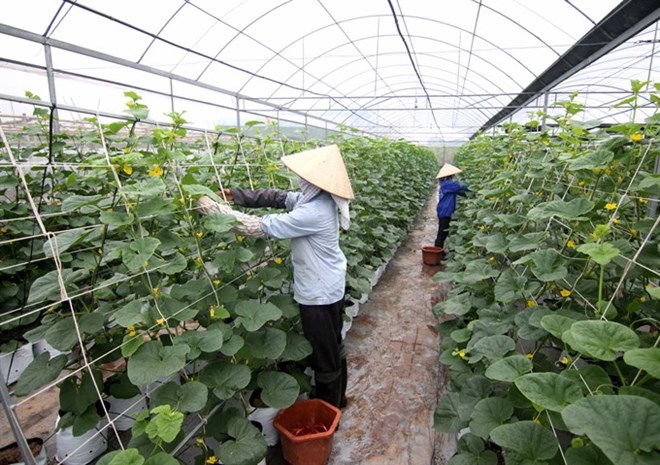 Hai Dang farm in My Thang commune of Nam Dinh province, with a total area of 12,000 sq.m. of greenhouse, is an example of hi-tech agriculture production in Nam Dinh province, generating 200 million VND (8,800 USD) in profits a year (Photo: VNA)
Hai Dang farm in My Thang commune of Nam Dinh province, with a total area of 12,000 sq.m. of greenhouse, is an example of hi-tech agriculture production in Nam Dinh province, generating 200 million VND (8,800 USD) in profits a year (Photo: VNA)
Hanoi (VNA) – A
thorough audit of all State-owned agricultural businesses will be carried out
in 2019 following next year’s concentrated restructuring efforts, so as to
identify underperforming firms and other issues facing the sector.
The findings will be
reported to the National Assembly, Deputy Prime Minister Vuong Dinh Hue said at
a conference last weekend.
The conference aimed to
review the progress of restructuring, renewing, and improving the operational
effectiveness of State-owned agribusinesses in the 2015-2017 period.
Ha Cong Tuan, Deputy
Minister of the Ministry of Agriculture and Rural Development (MARD), said that
40 out of 41 restructuring plans for the agriculture sector in cities,
provinces, and enterprises had been approved by the Prime Minister.
Hanoi’s agriculture
restructuring plan was still being reviewed and adjusted by the municipal
People’s Committee following feedback from the assessment council, he said.
Leaders of provinces
including Lao Cai in the north, and Khanh Hoa and Binh Dinh on the
south-central coast reported positive outcomes such as the streamlining of
staff following new business plans directed by the Prime Minister.
More encouragingly,
post-equitisation, previously 100 percent state-owned companies have seen
increased revenues and profits.
For example, annual
revenues of the Binh Duong Province Rubber Co Ltd have jumped nearly three-fold
post-equitisation, from 49 billion VND (2.16 million USD) to 133 billion VND (5.86
million USD). Many forestry companies under the Vietnam Forest Corporation
(Vinafor) or the Vietnam Rubber Group (VRG) also reported better earnings.
However, it was also
pointed out the overall progress over the last three years in implementing
Government’s 2014 Decree No. 118 on restructuring agro-forestry businesses had
not been satisfactory.
For example, in HCM City,
only 20 of 102 State-owned agriculture businesses have been equitised, and 28
companies that were supposed to be dissolved still remain operational.
Provincial agriculture
officials mentioned many obstacles and challenges that they face.
Lo Minh Hung, Vice Chairman
of the People’s Committee of northern mountainous province of Lao Cai, said
transforming SOEs into two-member limited liability companies was a totally new
concept with many implementation bottlenecks.
“The ‘second member’ of the
company is supposed to be a private entity, which poses very difficult
questions about capital ownership, investment direction and land
management. The land these companies are currently managing are really
favourable to agriculture. When a private company comes into the picture, the
repurposing of land could be a problem in our province,” he said.
Hung urged the Steering
Committee on Renovation and Development of Enterprises (under the Ministry of
Finance) to issue guidance on implementing this particular company model to
avoid losses and enable better management of capital and land resources.
Other provinces also
reported that many farms and forestry units which have converted to totally
State-owned companies or companies with majority State-ownership are facing
difficulties in sourcing capital, delays in granting charter capital additions
and lack of assets to use as collateral for bank loans.
A lot of companies
undergoing restructuring are also struggling with issues like land measurement
and mapping, brand valuation or resolving its bad debts, the conference heard.
For instance, the Vietnam
National Coffee Corporation is facing trouble collecting 380 billion VND (16.76
billion USD) of outstanding debt from coffee-planting households as there’s no
clear authority to handle this.
On the issue of land
measurement and mapping related to all restructuring agricultural enterprises,
which could end up costing 1,100 billion VND (48.44 million USD), Deputy
Finance Minister Tran Van Hieu said the problem was not the cost, as the
government will shoulder 70 per cent of it, but that local governments need to
take stock of existing land through field trips, not just gathering figures
from books.
Deputy Prime Minister Vuong
Dinh Hue said there were several reasons for the slow progress in restructuring.
Objectively speaking, this
is a complex matter as it involves financial problems and land issues lasting
decades, but the main cause remains a lack of commitment from some local
governments, according to Hue.
Other provinces that want
to finish the restructuring quickly lack practical plans, eventually slowing
the whole process because it takes time to adjust the plans.
Hue stressed that the case
of agricultural enterprises was different from the general restructuring effort
because it involved the livelihoods of millions of people, with social order
and security implications in many localities.
Underscoring that 2018 will
be “the year of restructuring,” he directed that all restructuring plans must
be completed and approved by the government in the final quarter of this year.
The Finance Ministry was
tasked with issuing guidelines encouraging private businesses to join the
two-member limited liability company model; and the Ministry of Environment and
Natural Resources was asked to quickly update its land and forest database.-VNA